Geshema Graduation 2022
Ten Tibetan Buddhist nuns formally received their Geshema degrees at a special ceremony in the holy city of Bodh Gaya on November 18, 2022. Now the world has a total of 53 Geshemas!
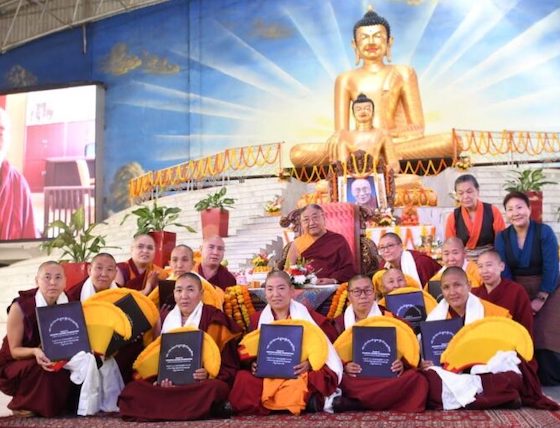
10 Tibetan Buddhist nuns receiving their Geshema degrees at the Geshema graduation 2022 in Bodh Gaya. Photo courtesy of DRC.
The Geshema degree is the highest level of training in the Gelugpa tradition and is equivalent to a PhD in Tibetan Buddhism.
The ceremony was attended by:
- 41st Sakya Trizin Kyabgon Gongma Trichen Rinpoche as the event’s chief guest
- Secretary Chime Tseyang from the Department of Religion and Culture
- The Director of the Tibetan Nuns Project, Nangsa Chodon
- The president of Geshema Examination Committee
- Tutors and participants of the Winter Session of Discussion on Pramana.
Of the ten recipients of this year’s Geshema’s Degree, four nuns are from Jangchub Choeling Nunnery, four are from Kopan Monastery, and two are from Geden Choeling Nunnery.

Secretary Chime Tseyang from the Department of Religion and Culture giving presents to the Geshemas. She thanked the lamas who for helping to fulfill His Holiness the Dalai Lama’s vision of empowering Tibetan Buddhist nuns through educating Buddhist scriptures traditionally studied by monks only. She also encouraged the Geshemas to serve all sentient beings. Photo from DRC.
About the Geshema Degree and the Geshema Exams
The Geshema degree was only formally opened to women in 2012. It is the same as a Geshe degree but is called a Geshema degree because it is awarded to women.
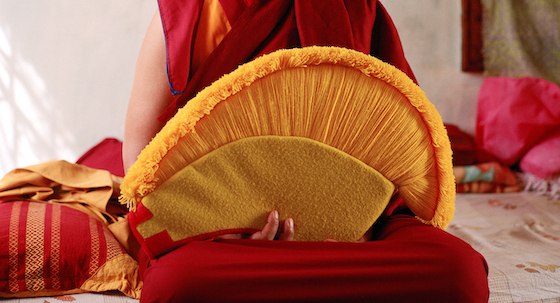
Photo of a Geshema holding the yellow hat that signifies her degree. Detail of photo by Olivier Adam.
The Geshemas are paving the way for other nuns to follow in their footsteps. This degree makes them eligible to assume various leadership roles in their monastic and lay communities reserved for degree holders and hence previously not open to women.
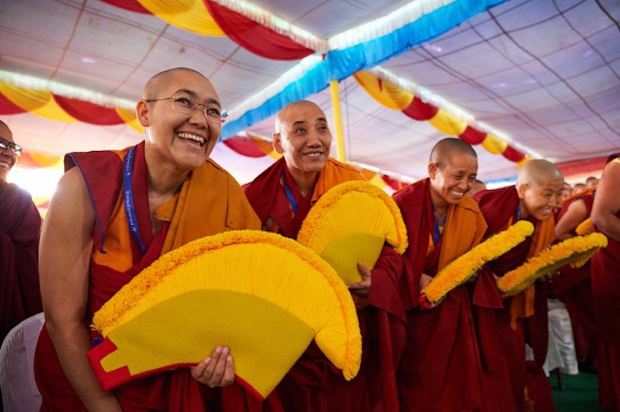
Joy among the 20 Geshema nuns who received their degrees from His Holiness the Dalai Lama at the historic Geshema graduation ceremony in December 2016. Photo courtesy of Olivier Adam
The 2022 Geshema exams were held at Geden Choeling Nunnery with 94 nuns taking various levels of the four-year exams as follows:
- 1st year: 59 nuns took exams, 56 passed
- 2nd year: 14 nuns took exams, 14 passed
- 3rd year: 10 nuns took exams, 7 passed
- 4th year: 11 nuns took exams, 10 passed
Thank you to everyone who sent good luck messages to the nuns!
Facts About the Geshema Degree
-
- The Geshema degree is comparable to a doctorate in Tibetan Buddhist philosophy.
- It is the highest level of training in the Gelugpa school of Tibetan Buddhism.
- The Geshema degree is the same as the Geshe degree for monks. The ending “ma” marks it as referring to a woman.
- Until recently, this highest degree could only be earned by monks.
- The historic decision to confer the Geshema degree to Tibetan Buddhist nuns was announced in 2012 by the Department of Religion and Culture of the Tibetan Administration, following a meeting of representatives from six major nunneries, Institute of Buddhist Dialectics, and the Tibetan Nuns Project.
- Candidates for the Geshema degree are examined on the entirety of their 17-year course of study of the Five Great Canonical Texts.
- To qualify to begin the Geshema process, nuns must score 75% or above in their studies to be eligible to sit for the Geshema exams.
- On December 22, 2016, His Holiness the Dalai Lama awarded 20 Tibetan Buddhist nuns with Geshema degrees at a special graduation ceremony held at Drepung Monastery in Mundgod, South India.
- In 2011, a German nun, Kelsang Wangmo, who spent 21 years training in India, became the first woman to receive the Geshe degree. This was before the Geshema degree process was approved in 2012.
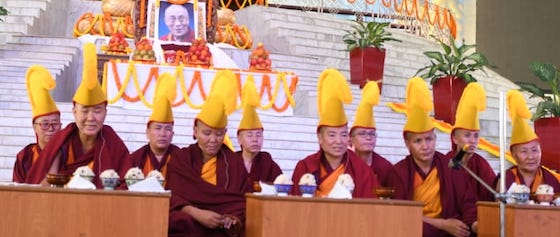
The 10 Geshemas who graduated on November 18th took part in a formal debate (damja) with hundreds of other nuns on November 16 and 17. Photo by the Dolma Ling Media Nuns
The Geshema Exam Process
To be eligible to take their Geshema exams, the nuns must first complete at least 17 years of study.
The Geshema examination process is rigorous. It involves four years of written and debate exams as well as the completion and defense of a thesis.
Each year, the nuns preparing to sit various levels of the examinations gather together for one month of final exam preparations and then about 12 days of exams. In 2022, the exams were held at Geden Choeling Nunnery. The 2020 and 2021 Geshema exams were cancelled because of the pandemic.
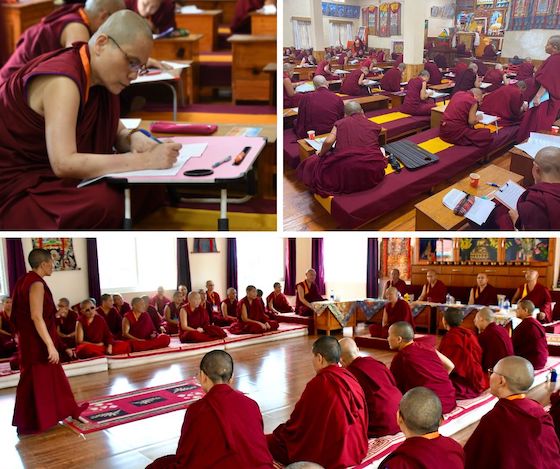
Collage of nuns taking written and oral (debate) exams as part of the 2022 Geshema exams. Photos by the Dolma Ling Media Nuns.
“The fact that growing numbers of women are achieving equality with men in the highest levels of Buddhist monasticism, by earning the equivalent of doctorate degrees, is joyous and of enormous importance to the world,” says Steve Wilhelm, a Tibetan Nuns Project board member. “This means that women monastics will be leading more monastic institutions, and will be teaching other women and men. Humanity needs this gender equity if we are to navigate perilous times ahead.”
The Geshema degree will make the nuns eligible to assume various leadership roles in their monastic and lay communities reserved for degree holders and hence previously not open to women.
The Number of Geshema Graduates
The first Geshema degree was conferred in 2011 to a German nun, Kelsang Wangmo.
In 2012, a historic decision was made to allow Tibetan Buddhist nuns the opportunity to take Geshema examinations.
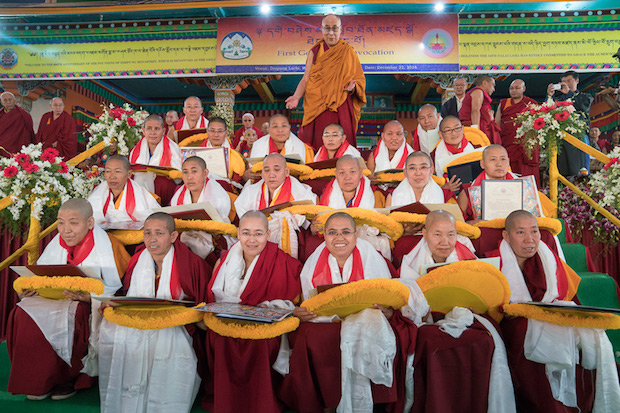
His Holiness the Dalai Lama with the 20 Geshema graduates at the degree ceremony in Mundgod, December 22, 2016. Photo courtesy of OHHDL.
In November 2022, another ten nuns graduated with their Geshema degree. This brings the total number of Geshemas to 53. (In 2011, a German nun, Kelsang Wangmo, who spent 21 years training in India, became the first woman to receive the Geshe degree. This was before the Geshema degree process was approved in 2012 so she is not counted here in the total.)
Here’s a list of the Geshema graduations since the formal approval in 2012:
- 2016: 20 nuns became Geshemas
- 2017: 6 nuns graduated as Geshemas
- 2018: 10 nuns became Geshemas
- 2019: 7 nuns graduated at the end of November
- 2020: exams cancelled due to the pandemic
- 2021: exams cancelled due to the pandemic
- 2022: 10 nuns became Geshemas at the 5th convocation ceremony, held in Bodh Gaya
Geshema Endowment
We are extremely grateful to the 159 donors to the Geshema Endowment, including the Pema Chodron Foundation, the Pierre and Pamela Omidyar Fund of the Silicon Valley Community Foundation, the Frederick Family Foundation, and the Donaldson Charitable Trust. We are also very grateful to all those who sponsor nuns and help them on their path.
The Geshema Endowment, launched by the Tibetan Nuns Project in 2021, ensures the long-term sustainability of the Geshema program. It cover the costs involved in training and qualifying more Geshemas including the costs of travel, food, and accommodation for the Geshema candidates to attend the exams. The fund also covers the cost of administration and materials for the exams and provides each new Geshema with a set of nuns’ robes and yellow hat that signifies the holding of the degree.
“As a Tibetan Nuns Project board member,” said Vicki Robinson, “I am so very proud of the achievements of the nuns who are working on the Geshema degree. It has been such a pleasure to watch these nuns assume leadership positions in the nunneries and to go where no women have gone before.”
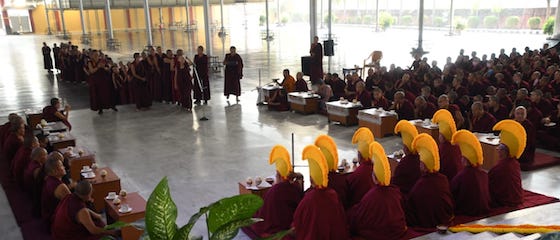
The 10 Geshemas took part in two days of formal debate their convocation. Hundreds of nuns were in Bodh Gaya for the Jang Gonchoe inter-nunnery debate.
Robin Groth, another board member, wrote, “I am thrilled by this news! This is what the work of the Tibetan Nuns Project and its donors is about — giving opportunity where it has not been before and then see lives change, dreams fulfilled, and leaders emerge. What an honor to witness this evolution.”
What do Geshemas and Geshes Study
To graduate with a Geshema or Geshe degree, one studies the five essential Buddhist texts over about 20 years. The method of study involves logical analysis and debate, combined with regular sessions of prayer and recitation.
Each of the final-year candidates has to write, in advance, a 50-page thesis. Examiners test the candidates on their thesis papers during the exams and the nuns must give an oral defence. Learn more about what Geshemas study here.
Tibetan Buddhist nuns are making history. Following further study and exams in Buddhist Tantric Studies, the Geshemas are becoming fully qualified as teachers. In 2019, two of the Geshemas who graduated in 2016 were hired as teachers at Dolma Ling Nunnery and Institute.

I rejoice in the incredible hard work and dedication of all these Geshema. May they inspire countless beings to make progress along the path, and may their accomplishments truly benefit all sentient beings!!
To the nuns who did not pass exams this time, take heart! Each of you is a priceless treasure.